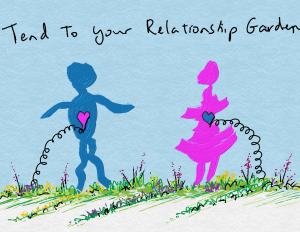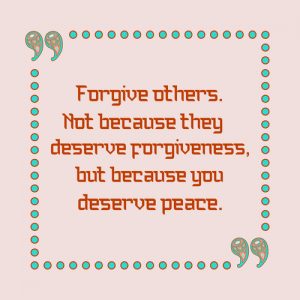5 Mindset Shifts For Healthy Relationships

Many of us struggle with having healthy relationships. No matter how hard I work on my relationships, at some point, I’ll run into conflicts. I can’t always save the relationship because it takes two for it to work, but I always learn from my experiences and strive to do better. Because I have struggled with my relationships for so many years, I’ve learned a lot. So I thought I’d share some of my favorite mindset shifts for healthy relationships that have helped me over the years.
-
Tend to Your Relationship Garden
The first healthy mindset shift is one that I learned from Jason Gaddis, a relationship expert. If we think of our relationships like a garden, they require a lot of nurturing and attention, and need a lot of work. A good relationship requires that we are kind and forgiving to each other. It requires us to listen, and show that we care. It requires up to support each other and be a trusted friend. The more we act this way, the better our relationships will be and the better relationship garden we’ll have.
Another perspective on this is from John Gotman’s work. Dr. Gotman is a respected clinician and a marriage researcher. He has been observing and videotaping people in relationships in what he called ‘an apartment laboratory’. And just in 15 minutes time, he can predict whether these relationships are going to succeed or fail in 15 years.
Bids for Connection
Based on his research, Dr. Gotman introduced the concept of emotional bids for connection. A bid for connection is any signal that we want attention, affirmation or a positive connection. Partners make emotional bids to establish and maintain connection and these are a key point to any relationship.
People can answer your emotional bids in three different ways.
They may turn towards your bids – they let you know that they’ve heard you and are in agreement with you. They are bidding towards you to support, facilitate, and help your relationship grow.
However, people may also react to your bids for connection by turning away or ignoring you. They could also change a subject or not acknowledge your emotions.
Finally, there is bidding against. This happens when another person displays an irritable, negative or even hostile reaction to your bid for emotional connection. This type of response creates a lot of tension in the relationship.
Obviously, couples who bid towards each other have the healthiest relationships. Couples that bid against each other will have a lot of tension in the relationship, and unless they find a way to have healthier interactions, it is doomed to fail. If a member of the relationship turns away enough times, that relationship will end quickly.
Read more about emotional bids for connection in How to Have a Conscious Relationship.
So, nurturing your relationship garden is an important mindset shift towards happy, fulfilling relationships. We need to keep in mind that every interaction with other people matters – taking care of each other and being good to each other is a great way to nurture your relationship garden.
-
Don’t Make Assumptions, Collect Data
Making assumptions is a part of being human. But if someone says something that hurts us, it is important to collect more data before assuming that their intentions were to do us harm.
Our interpretations of other people’s words and actions is based on our own background, history and perspectives. It is not always the truth, nor should we interpret it that way.
 So lets give people the benefit of the doubt. Ask for clarity if someone says something hurtful. Being curious and asking for feedback about what people’s intentions are can go a long way to helping with harmony in a relationship.
So lets give people the benefit of the doubt. Ask for clarity if someone says something hurtful. Being curious and asking for feedback about what people’s intentions are can go a long way to helping with harmony in a relationship.
-
Everyone is Doing the Best They Can
This mindset shift is profound, but not always easy to believe. For example, If you are dealing with a narcissist or a sociopath, it may be extremely hard to see that they are doing the best they can.
However, developing this belief system is vital to make our relationships work. We will never be able to forgive or see the person’s other side, unless we come to the belief that everyone is doing the best they can with what they have in the moment.
So how can we convince ourselves that everyone is doing the best they can?
Our sensory systems are not all the same. Some of us see better than others, some are color blind, some are more focused on details than others. And when you add all the other sensory systems we have (taste, touch, smell and kinesthetic), we begin to realize there are tons of variations in which we can see the world.
Our backgrounds and our inherited experiences shape our belief systems and create a filter through which we perceive the world. Here is an example of how when we change of our filters can change how we see the world around us. For more on different perspectives and filters, check out my article How to Get from Conflict to Understanding.
Our emotions can hijack the adult, decision-making part of our brain called the frontal cortex. This is called the amygdala hijack. When this happens, we don’t think as clearly as our wise inner self does. This is part of being human, though, and we are all subject to it if we are stressed out enough. Obviously, it can prevent us from being at our highest self. But at that moment, that person is doing the best they can.
So try to adapt the mindset that everyone is doing the best they can with what they have in the moment. It will help you be more forgiving of yourself and others.
-
Don’t Shy Away from Disagreement
Believe it or not, being conflict avoidant can destroy relationships. Why? Because people who are conflict avoidant don’t tend to stand up for their needs.
 For most of my life, I had a hard time setting boundaries. I would let people treat me badly, pretending like it didn’t really hurt. But it did. Then I would get angry and resentful.
For most of my life, I had a hard time setting boundaries. I would let people treat me badly, pretending like it didn’t really hurt. But it did. Then I would get angry and resentful.
When I let these people be mean to me, they subconsciously believed that it was OK to treat me badly. So they would continue to do so, and they would respect me less. This wasn’t good for my self-esteem or my ability to love myself. I was not teaching others about how I need to be treated. I lost respect from these people because I didn’t know how to set healthy boundaries.
When we set healthy boundaries, it is the first step to finding a way to create a win-win situation. It shows that we know what we want. But we also need to know how to do it without creating more conflict. Learn more about how to have healthy conflicts hereand how to respectfully discuss divisive topics here.
5. Ask yourself, “What will it take to forgive?”
This mindset shift is very important when you feel really angry with somebody, or when you are profoundly hurt. If you keep asking yourself this question, it will open your mind to exploring what is possible.
 When people fail to fulfill our expectations and needs, we need to find ways in our hearts to forgive them. We aren’t seeking to forgive them for their sake, but for ours. Forgiving them is our personal path to peace, and affects how we show up in future relationships. Therefore, we need to keep asking ourselves, “What will it take to forgive? “ Sometimes the person we have to forgive is ourselves.
When people fail to fulfill our expectations and needs, we need to find ways in our hearts to forgive them. We aren’t seeking to forgive them for their sake, but for ours. Forgiving them is our personal path to peace, and affects how we show up in future relationships. Therefore, we need to keep asking ourselves, “What will it take to forgive? “ Sometimes the person we have to forgive is ourselves.
If we are struggling to forgive, it might be useful to work on releasing the triggers that make us angry with this person. We often have to change the story we are telling ourselves to be able to forgive. Here is more about how releasing triggers improves our relationships.
Have you discovered any mindset shifts for healthy relationships? If so, I want to hear from you. Include you comments below!
Is there too much conflict in your life? Do you want more harmony in your relationships? If you need support in getting the relationship you want, check out my Learn to Love Again program and contact me here for a complimentary consultation.



